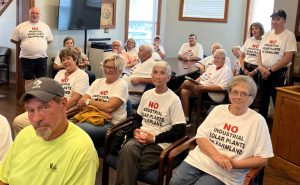
An Ohio court is set to rule on whether legislators violated the state constitution with late additions to a poultry bill that labeled natural gas as “green energy” and changed prior law to accelerate oil and gas drilling from state parks and wildlife areas.
Multiple drilling proposals are now pending, with public comments due on the first batch of parcels by July 20. While the court case has not blocked those proposals, the litigation could eliminate the “green energy” label and affect how lawmakers pass future bills.
Briefing wrapped up last month on environmental groups’ request for the Franklin County Court of Common Pleas to declare lawmakers’ passage of House Bill 507 violated two constitutional requirements. One says “no bill shall contain more than one subject.” The other requires each house in the General Assembly to consider each bill on three different days unless two-thirds of the respective house suspends the rule.
HB 507 began as a two-page bill to reduce the number of chicks sold in lots from six to three. The bill swelled to 88 pages by the time the Senate passed it on Dec 7, just one day after multiple amendments were proposed for the first time, including the natural gas provisions plus other amendments ranging from the use of pesticides on private property to towing cars in conservancy districts.
Gov. Mike DeWine noted the expansion of the bill’s subjects when he signed HB 507 into law on Jan. 6: “While the bill initially involved agricultural issues, amendments were added regarding drilling and natural gas issues.”
Get connected
Every morning, thousands of energy professionals turn to our newsletters for the day’s most important news. Sign up for free to get the latest delivered straight to your inbox.
“The purpose of the one-subject rule is to protect the rights of Ohioans to participate in the democratic process by making it clearer what bills the state legislature is working on,” said attorney Claire Taigman at Earthjustice, which is acting as counsel for the Buckeye Environmental Network, Ohio Valley Allies, Sierra Club and Ohio Environmental Council.
And while the state Senate held three hearings on the bill before the December amendments, those hearings dealt only with the poultry provision and some food safety amendments added by the House.
The substitute bill reported out by the Senate Agriculture and Natural Resources Committee on Dec. 7 was a “vitally altered” bill, the environmental groups said in their brief. Instead of having more hearings and time for public comment, the bulk of the bill’s text “went from non-existent to enacted” in less than a week.
Spokesperson Steve Irwin said the Office of the Ohio Attorney General does not have any additional comments for this article beyond its court filings. The state’s brief claimed HB 507 satisfies both the one-subject and three-consideration rules.
“Land use, energy development, protection of natural resources, and conservation are undeniably linked to agriculture,” the state’s lawyers wrote, arguing that the single-subject rule was satisfied.
And those claimed links meant no more hearings were needed under the three-consideration rule, the state’s lawyers argued. “From its introduction until its enactment, HB 507 had a common purpose of amending Ohio’s agriculture laws,” the brief said.
Taigman is not buying it.
“No definition of ‘Agriculture,’ including the one in Ohio statutory law, encompasses mineral extraction activity such as gas production and development,” she said. The state’s argument also “defeats the entire purpose of the one-subject rule because there is no way for a person to know what subjects a bill actually covers when a category is so broad and vague.”
A 2019 Paulding County case accepted state lawyers’ argument that a last-minute budget bill amendment that tripled wind turbine setbacks in 2014 fit into the broad subject of “conditions for the operation of state programs.” Statewide funding bills typically start out dealing with a wide range of programs, although late amendments remain controversial.
Yet a Franklin County appeals court ruled that a non-budgetary bill was unconstitutional when the state tried to lump housing authority boards, extracurricular activities for charter schools and local zoning authority into the broad category of regulating local housing. The environmental groups cited the case as support to show the state’s approach goes too far.
But is there a case?
The state’s lawyers have also challenged the environmental groups’ right to even be in court.
Among other things, they argued, there’s no harm in calling natural gas “green energy,” because the law doesn’t specify consequences from that definition.
“A basic concept of statutory interpretation … is that every word in a bill has meaning and is there for a reason,” Taigman said. “In this case, the ‘green energy’ provision is there to try to redefine the reality that gas is a dirty fuel that contributes significantly to climate change and harms public health.”
Ohio Sen. Mark Romanchuk, R-Ontario, previously told the Energy News Network he came up with the idea to make it easier for companies to meet ESG investment standards. ESG refers to environmental, social and governance criteria. Taigman said the law sets the stage for future impacts when laws and regulations refer to “green energy.”
The state’s brief also argued that HB 507’s terms for oil and gas drilling on state lands are moot, meaning they no longer matter.
HB 507 changed a 2011 law to say state agencies “shall” lease lands for oil and gas leasing. The change would have made leases mandatory instead of giving agencies a choice.
The provision only applied until a leasing commission adopted procedures and lease terms for making those decisions, however. That happened this spring, so the commission’s actions now fall under the rest of the 2011 law.
Yet the current leasing push is underway only because HB 507 unleashed a “bureaucratic steamroller” that forced the commission’s swift adoption of rules and lease terms, the environmental groups’ filing replied. And the groups worry about potential harm to state lands.
The law “just allows the oil and gas industry to extend their reach,” said Shelly Corbin, an Ohio campaign representative with the Sierra Club’s Beyond Dirty Fuels program. And potential harm to public lands and parks would take generations to remedy, at a minimum, she added. “That is why it’s so important to put the effort and resources behind litigation like this.”
Pending proposals seek to drill from areas at Salt Fork State Park, Wolf Run State Park, and the Valley Run and Zepernick wildlife areas, plus other state-owned land.
“This is coming at a time when we all need to transition away from oil and gas due to the climate crisis,” Taigman said. “HB 507 set this disaster into motion, and the legislature passed the bill during a lame duck session with very little transparency or public input.”
Even if the claims were moot, the environmental groups still want the constitutional issues addressed, because those questions remain debatable.
“It is important that the legislature know these are real constitutional protections that must be followed, and it is important that Ohioans know they are entitled to these protections,” Taigman said.



